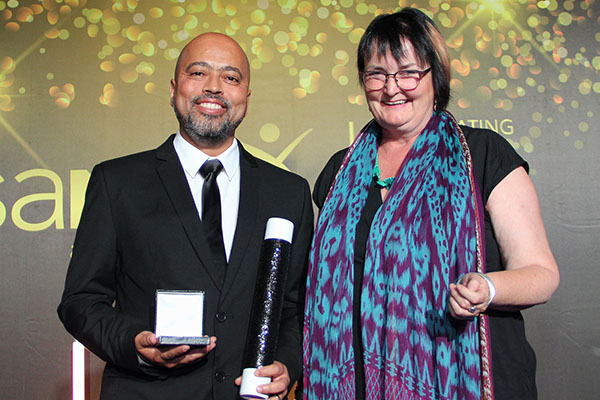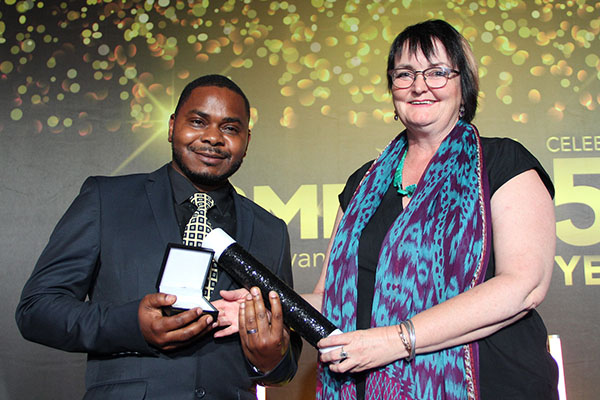The Division of Molecular Biology and Human Genetics at Stellenbosch University's the Faculty of Medicine and Health Sciences recently had cause to celebrate two extraordinary researchers. Professors Craig Kinnear and Novel Chegou both received SA Medical Research Council Silver Medal Achievement Awards at the SAMRC 2019 Scientific Merit Awards in November.
Kinnear, from the Tuberculosis Host Genetics Research Group, and Chegou, from the Immunology Research Group received the awards for their outstanding lifetime scientific contributions to health research.
The Division's Facebook page described the two scientists as “an inspiration to both fellow colleagues and students within our institution".
“It is this perseverance, excellence and innovative thinking that motivates all of us to continue working diligently at the task at hand, no matter how difficult or exhausting, as it is all for a great cause – the advancement of health research and, in turn, societal wellbeing within our country and globally."
Kinnear is an associate professor in the department of Biomedical Sciences and currently holds the position of Specialist Scientist at the SAMRC Centre for Tuberculosis Research and is the Laboratory Head of the SAMRC Genomics Centre.
Originally from Kraaifontein in the Cape, he completed his PhD in the Division of Molecular Biology and Human Genetics at Stellenbosch University in 2007. For his PhD, he focused on identifying novel genetic predisposing factors involved in the pathogenesis of obsessive-compulsive disorder and schizophrenia. He also looked at the signalling pathways involved in neuronal migration and brain development. His work in psychiatric genetics led to some of the first publications in psychiatric genetics in South Africa.
After his PhD, Kinnear shifted his focus to cardiovascular genetics. He researched the molecular mechanisms underlying the development of cardiac hypertrophy in patients with Hypertrophic Cardiomyopathy.
“I established a small research team that published high impact, cutting edge research on Hypertrophic Cardiomyopathy and LongQT syndrome that identified novel proteins and pathways involved in the pathogeneses of these disorders. “
In 2013, he joined the TB host genetics team where he currently focuses on identifying disease-causing mutations in patients with primary immunodeficiencies who are extremely susceptible to tuberculosis.
Additionally, he focuses on the genetics of Primary Immunodeficiency's (PIDs) and co-founded the Primary Immunodeficiency Diseases Genetics Network (PIDDGEN), a multidisciplinary team that has provided genetic diagnoses to several PID patients.
Chegou is an associate professor in the Division of Molecular Biology and Human Genetics and his research focuses on the immunology of Mycobacterium tuberculosis infection. He is currently working on biomarkers for the diagnosis of tuberculosis, biomarkers of protective immunity against Mycobacterium tuberculosis, and biomarkers for monitoring of the response to tuberculosis treatment amongst others.
Chegou's work is focussed particularly on developing simple field-friendly point-of-care diagnostic tools for the rapid diagnosis of tuberculosis in resource-constrained settings.
He works on both pulmonary and extra pulmonary TB including TB in children and currently co-leads the diagnostics subgroup of the SU Immunology Research Group.
Chegou, who trained as a Medical Laboratory Scientist at the University of Buea, in his home country, Cameroon, moved to South Africa in 2004 and has, since 2005, been working on diagnostics for TB.
His research was motivated by the many deficiencies in the tools used in diagnosing TB, especially in resource-depleted areas. “The tests we have been working on have the potential to give results in 30 minutes. These are not confirmatory tests, but just screening tests which enable a healthcare worker to indicate that there is a high chance the patient has TB or, alternatively, if the chances of TB are small. They can also then start providing alternative treatment, where needed, without making the patient wait for weeks for TB test results.
Both scientists said they felt honoured to receive the prestigious awards.
“It is great to be acknowledged for your work," said Kinnear. “It was special that, at the ceremony, they recognized our development of young scientists. Part of my job is to mentor and supervise young post-graduate students. I've supervised several MSc and PhD students through to the completion of their degrees. Working with young people is the best and most rewarding part of my job."
He added: “I don't want to take all the credit for this award. It is a culmination of the work I've done with many other people in the twenty years I've been doing this." Kinnear said the awards has given a profile to his work.
Chegou said: “This award is a huge honour. As researchers, we identify a problem, design an experiment and hope the experiment provides data that will point us towards the tools that could be developed to address that issue. You don't expect to get awards as a result of that. I feel privileged to have been recognized."
The award is the latest good news in what Chegou described as “a very rewarding second half of the year" which included him being “blessed by the birth of a baby boy" in November.
He recently received international funding from the European and Developing Countries Clinical Trials Partnership (EDCTP) to validate biomarkers and, together with a project team including paediatric neurologists and engineers, develop a novel point-of-care test for the diagnosis of tuberculous meningitis in children. He also recently received a Strategic Health Innovations Partnership (SHIP) grant from the SAMRC for the development of a host RNA based test for TB, and is part of another recent larger multinational EDCTP grant led by Prof Gerhard Walzl, that will evaluate the usefulness of one of the point-of-care TB triage tests that the group has developed, in the diagnosis of TB in Uganda, Gambia and South Africa.
Chegou said: “The SAMRC merit award would not be possible without the contributions of numerous members of our research group and international collaborating partners that includes clinicians, nurses, research assistants, past and present students and engineers. Although the merit award was an individual award to me, it is actually the result of work that has been done in collaboration with all these partners and without them, such awards wouldn't be possible."
Banner caption: Profs Craig Kinnear, Rob Warren and Novel Chegou at the SAMRC 2019 Merit Awards.
Picture caption 1: Prof Craig Kinnear receives his award from Prof Rachel Jewkes.
Picture caption 2: Prof Novel Chegou receives his award from Prof Rachel Jewkes.

